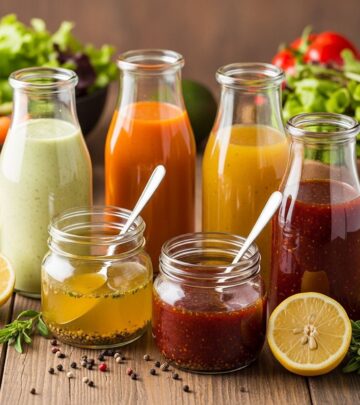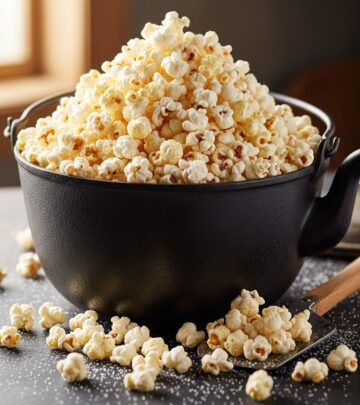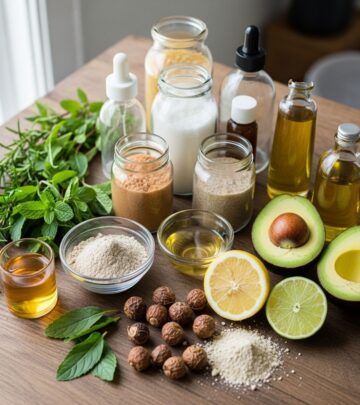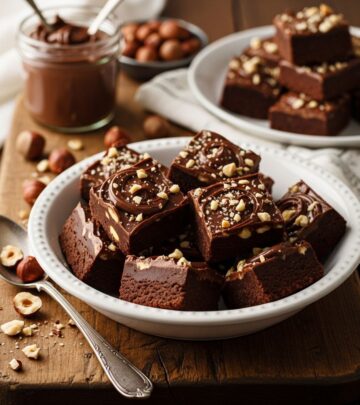Korean BBQ Sauce Recipe: 5 Expert Tips For Perfect Flavor
Discover the bold flavors and endless versatility of homemade Korean BBQ sauce, from classic recipes to expert tips and serving ideas.
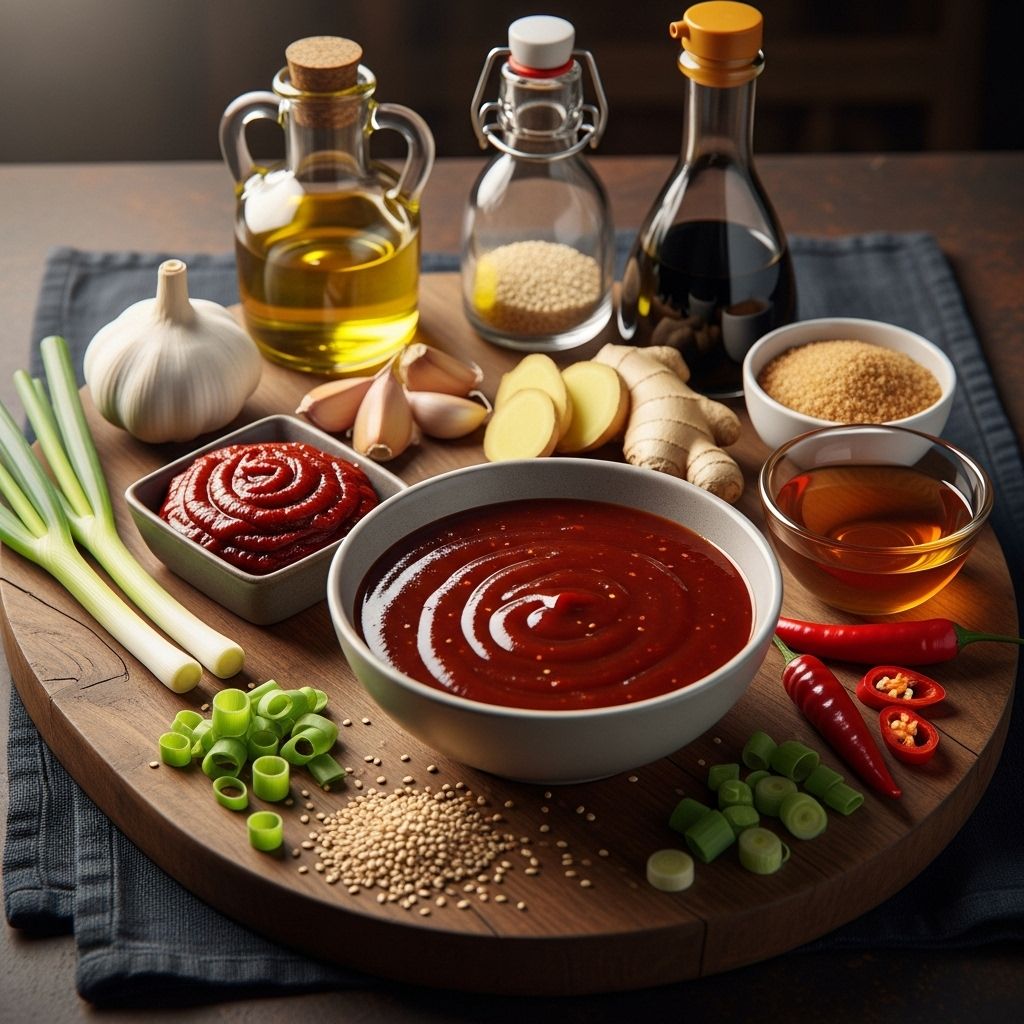
Image: HearthJunction Design Team
Korean BBQ Sauce: Sweet, Savory, and Irresistible
Korean BBQ sauce is the heart of many iconic Asian dishes, known for its captivating balance of sweet, savory, and spicy flavors. Whether you’re looking to glaze grilled meats, marinate chicken, or add zest to stir-fries, mastering this versatile condiment will upgrade your kitchen repertoire. In this guide, we’ll cover everything you need to know about making, using, and storing Korean BBQ sauce, along with expert tips and creative variations.
What Is Korean BBQ Sauce?
Korean BBQ sauce, often referred to as bulgogi sauce or galbi sauce depending on its intended use, is a thick, glossy condiment that marries soy sauce, brown sugar, garlic, ginger, and sesame oil with a touch of spice. Used as both a marinade and dipping sauce, it’s beloved for its complex, mouthwatering profile and adaptability with various meats and vegetables.
Key Ingredients in Korean BBQ Sauce
The beauty of Korean BBQ sauce lies in its balance of flavors and textures. Here are the essential ingredients you’ll need:
- Soy Sauce: The savory foundation and umami backbone.
- Dark Brown Sugar: Brings deep sweetness and helps caramelize the sauce.
- Garlic (minced): Adds pungency and warmth.
- Rice Wine Vinegar: Introduces acidity for a bright, tangy note.
- Chile-Garlic Sauce: Optional, but gives a spicy kick and extra depth.
- Fresh Ginger (grated): Supplies zesty, aromatic flavor.
- Asian Sesame Oil: Lends nutty, toasty undertones.
- Cornstarch and Water: Thickens the sauce for that signature clingy, glossy texture.
- Ground Black Pepper: A subtle heat booster.
Step-by-Step: How to Make Korean BBQ Sauce
This sauce comes together quickly and can be customized to your preferred taste and spice level. Here’s a simplified process to guide you:
- Combine soy sauce, dark brown sugar, minced garlic, rice wine vinegar, chile-garlic sauce (if using), black pepper, ginger, and sesame oil in a saucepan.
- Bring the mixture to a boil over medium heat, stirring occasionally to dissolve the sugar.
- In a separate bowl, whisk cornstarch with water to form a smooth slurry.
- Once the sauce is boiling, lower the heat to a simmer and slowly whisk in the cornstarch slurry.
- Continue whisking until the sauce thickens—usually just a few minutes.
- Remove from heat. Allow to cool slightly before using, or transfer to an airtight container for later.
Tips for the Best Korean BBQ Sauce
- Balance is Key: Taste frequently and adjust sugar, vinegar, and spice levels to match your preferences.
- Go Fresh: Fresh garlic and ginger make a notable difference in flavor depth compared to powders.
- Customize the Kick: Add more chile-garlic sauce for extra heat, or omit for a milder result.
- Don’t Overcook: Once thickened, remove from heat to avoid burning the sugars.
- Let It Rest: Flavors meld and intensify if the sauce rests for a few hours before use.
Variations and Substitutions
Korean BBQ sauce is endlessly adaptable. Consider these swaps and flavor boosters:
- Sweeteners: Try honey, maple syrup, or coconut sugar in place of brown sugar.
- Vinegar: Apple cider vinegar or white wine vinegar can be used if rice vinegar isn’t available.
- Heat: Gochujang (Korean fermented chili paste) or Korean red pepper flakes add authentic spice and color.
- Fruit Additions: Blend in a bit of grated Asian pear or apple for subtle sweetness and traditional flair.
- Umami Upgrades: A splash of Worcestershire or a little fish sauce for extra savoriness.
How to Use Korean BBQ Sauce
This versatile sauce can be utilized in a wide array of dishes. Here are some popular ideas:
- As a Marinade: Perfect for beef, pork, chicken, tofu, or salmon. Marinate proteins for at least 30 minutes—longer for deeper flavor.
- Grilling Glaze: Brush onto meats or vegetables during the final minutes of grilling for a sticky, caramelized finish.
- Sauce for Stir-Fries: Toss cooked vegetables and proteins with the sauce right before finishing.
- Dipping Sauce: Serve alongside grilled skewers, dumplings, or spring rolls.
- Sandwich Condiment: Add a zesty boost to burgers, wraps, or cold noodle salads.
Storing and Freezing Korean BBQ Sauce
Homemade Korean BBQ sauce is easy to make ahead and store:
- Refrigeration: Store in an airtight container for up to 1 week. Stir before each use.
- Freezing: Freeze in a tightly sealed container for up to 1 month. Thaw in the refrigerator, whisking to recombine if separated.
- Tip: Freeze in ice cube trays and transfer cubes to a bag for convenient portioning.
Allrecipes Community Tips and Praise
“I loved it a lot. The flavors complement each other very well. The thing I did differently was just how I cooked it. I threw the ingredients of the sauce in a slow cooker with pork ribs and let it do its magic that way.”
— Allrecipes Community Member
Many cooks find that customizing cook times or using slow cookers with the sauce produces delicious results. Don’t hesitate to experiment!
Expert Korean BBQ Pairings
| Protein/Vegetable | Ideal Use | Flavor Pairing |
|---|---|---|
| Beef (short ribs, bulgogi) | Marinade/Grill | Sesame, black pepper, scallions |
| Pork (ribs, belly) | Slow Cook/Glaze | Gochujang, garlic, ginger |
| Chicken (thighs, wings) | Marinade/Bake | Honey, soy, chili sauce |
| Salmon/Tofu | Broil/Grill | Ginger, sesame, lime |
| Vegetables (mushrooms, zucchini, bell peppers) | Grill/Serve as Dipping Sauce | Rice vinegar, chili, sesame |
Frequently Asked Questions (FAQs)
What makes Korean BBQ sauce different from other BBQ sauces?
Korean BBQ sauce emphasizes sweetness, umami, and a hint of spice, using soy sauce, brown sugar, ginger, and garlic as core flavors instead of smoky or tomato-based elements found in Western BBQ sauces.
Can I make Korean BBQ sauce gluten-free?
Absolutely. Substitute regular soy sauce with tamari or a gluten-free soy sauce alternative and double-check all other ingredients for hidden sources of gluten.
How spicy is Korean BBQ sauce?
Spice levels vary. The base recipe is mild, but you can adjust by adding more chile-garlic sauce, gochujang, or red pepper flakes for heat.
How long does homemade Korean BBQ sauce last?
When stored in an airtight container in the refrigerator, it typically lasts up to 1 week. For longer storage, freeze for up to 1 month.
What are the best dishes to use Korean BBQ sauce with?
It’s incredibly versatile—try it with grilled meats, ribs, chicken, salmon, tofu, or as a dipping sauce for dumplings and vegetables.
Pro Tips for Restaurant-Style Korean BBQ
- Marinate Overnight: For meats like beef short ribs or bulgogi, marinate overnight to infuse maximum flavor and ensure tenderness.
- Use Asian Pear: Traditional recipes often use grated Asian pear in the marinade for natural sweetness and tenderizing properties.
- Double the Batch: Korean BBQ sauce keeps well, so make extra for spontaneous midweek meals or gifts.
- Pair with Banchan: Serve alongside classic Korean side dishes such as kimchi, pickled vegetables, and steamed rice for an authentic experience.
Conclusion: Bring Korean Flavor to Your Table
Crafting your own Korean BBQ sauce at home is simple, rewarding, and endlessly adaptable. From buzzworthy marinades and grilling glazes to the perfect dip for crispy spring rolls, this sauce brings bold, harmonious flavors to all kinds of dishes. So grab your pantry staples, experiment with variations, and enjoy the sweet-spicy magic of Korean BBQ sauce in your kitchen today!
References
- https://www.allrecipes.com/recipe/231131/korean-bbq-sauce/
- https://www.allrecipes.com/recipe/246172/easy-bulgogi-korean-bbq-beef/
- https://www.allrecipes.com/gochujang-bbq-sauce-recipe-8675665
- https://www.allrecipes.com/recipe/21033/korean-bbq-chicken-marinade/
- https://www.allrecipes.com/recipe/141716/korean-bbq-short-ribs-gal-bi/
Read full bio of Anjali Sayee

